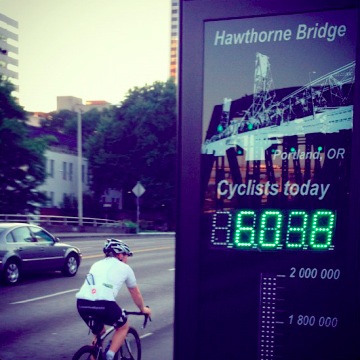 |
| Bikeportland.org |
The Portland City Club’s report on bicycles has
done a very comprehensive job of summarizing the current state of affairs and
future of cycling in Oregon. With the report’s release everyone has been abuzz
about the recommendation for a 4% tax on new bike sales. I’m on the fence over
whether it’s necessary or not. I want to look past the bike-tax that has been
making the headlines and look at one of the things the tax would be used to pay
for: automatic bike counters, like the one on Hawthorne Bridge. More automatic bike counters
around the city will mean hundreds of volunteer bike counters will be out of
work. And that’s a good thing, because automatic bike counters will provide
more data to support future bike infrastructure and volunteer bike counters
will be free to pursue other unselfish civic co-production commitments.
Portland has been working diligently to increase bike
ridership and making it a part of our daily lives for the past 15 years. The
city wears the title “Bike City, USA” proudly, even though Minneapolis currently holds the honor. We’re
just letting them hold onto it temporarily. Portland’s Bicycle Plan for 2030 outlines an optimistic
20-year vision for the city and calls for 25% of all trips to be made by bike.
This was perhaps the first time the bike-tax hot-topic button came up because
the report mandated a study of “funding concepts” which would be used to make
the plan become a reality. Some of the concepts include cyclist specific
revenue sources like the sales tax on bikes, licensing and registration, and
even advertising in bike-lanes, or region-wide sources like “green”
transportation bonds.
Even with a shaky transportation budget, Portland’s bike
network and ridership has grown significantly with modest investments and a
tremendous amount of volunteering. The bike network as of the Bicycle Plan for 2030
consisted of 30 Greenways and 283 bikeway miles. In 2011, two years later,
Portland added 16 more Greenways and there were 303 bikeway miles in the
network.
The modest public investments would not be as valuable,
however, without the help of people who love bicycling. It might even be that
we wouldn’t ever have made it on Bicycle Magazine’s list of bike-friendly
cities, let alone being called “Bike City, USA”, without people giving their
time and money to support the culture. Volunteers can be found at Portland
Bureau of Transportation (PBOT), the Bicycle Transportation Alliance (BTA), and
Cycle Oregon to name a few. PBOT is supported by volunteers from their Bike Count Volunteer program which conducts
regular bicycle counts around the city. The BTA is a non-profit promoting
bicycling since 1990. Cycle Oregon is a similar non-profit that donated the nation’s first automatic bike counter.
The U.S.’s first bike counter was installed less than a year
ago on the Hawthorne Bridge and logged in 1,000,000 trips on April 1st, 2013. The
automatic bike counter was made by Eco-Counter for $20,000 and donated to PBOT by
Cycle Oregon on August 8th, 2012. The counter
tracks ridership 24/7 and 365 days a year. It provides daily trips and
year-to-date trips on a display at the end of the Hawthorne Bridge and it tracks and charts basic stats on online.
Replacing volunteer cyclist counters with bike counters may
be a good thing however. Bike counters, like the one installed on Hawthorne
Bridge, provide year-round count data that can be used to measure progress.
It’s one step closer to an Intelligent Transportation System (ITS), which
allows for real-time data to be compiled and analyzed. Automated bike counters
are an investment that provides accurate and reliable data which is necessary
to justify public expenditures and secure additional funding.
Of course, volunteer bike counters won’t completely go away
because of automated bike counters. Theoretically, it’s likely that some will
continue to provide their time counting bicycles in areas of the city not
covered by automated bike counters, areas of the city that have been overlooked or unreachable because there wasn’t enough manpower. Others will commit their volunteer time
towards other civically minded pursuits that will help Portland become the next
“something very cool, USA”.
I think it’s unclear whether the city is ready for a
bike-tax or not because there are plenty of valid arguments for and against. I
also think it’s a shame that there might be people who love bicycling and will
not be able to contribute to it by volunteering to count bikes. But in light of
that, I think automatic bike counters are a necessary tool and a good
investment for growing bike infrastructure and securing funding.

Bike counters seem really cool!
ReplyDelete